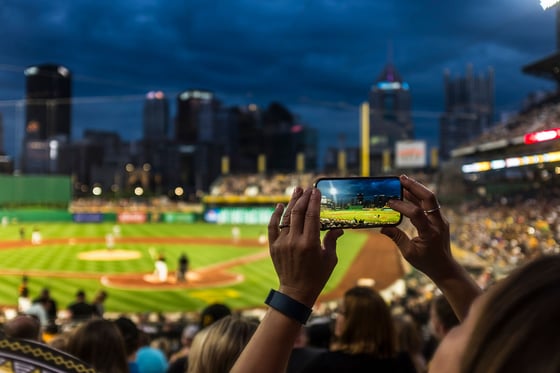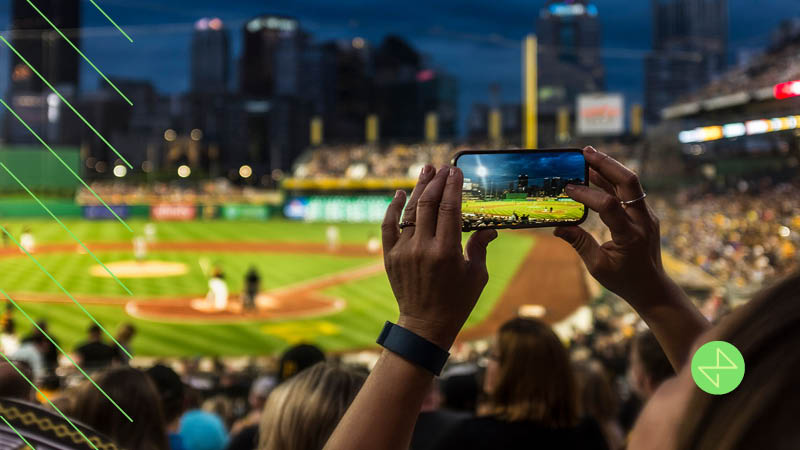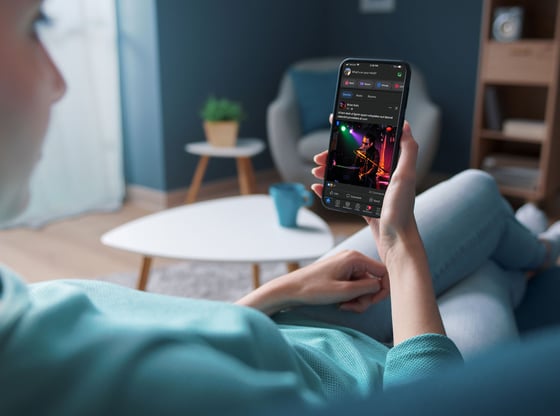Using Social Media Marketing to Connect with Audiences at Live (Or Virtual) Events
The role of media in events should never be underestimated. Brands benefit significantly from active social media interactions and engagement during popular live events, whether in person or virtual—and you don't even have to be the host.
This means more exposure and strengthened connections without the hassle or cost of putting it together yourself. For example, Absolut will be leveraging their presence at Coachella with a metaverse. The virtual three-floor installation is meant to expand its footprint beyond the event into the wider digital world.
According to Event MB, 58% of marketers use social media at live events for marketing. Moreover, 52% of events engage on social media several times a day. This gives you a unique opportunity to reach new audiences through live event marketing and engage with them in the comment section or via tagging. Which platform you use depends on your audience. However, the report found that the best social channels to build a community and for year-round engagement are Facebook (57%), LinkedIn (25%), Twitter (7%), and Instagram (7%).
As the pandemic’s uncertainties continue, there will likely be a mix of live and virtual events which can only mean more access for all and more bang for the buck for brands. With the right social media marketing plan, you'll be well on your way to reaching and resonating with more people as well as existing customers. Here's what you need to know about social media event marketing and how to get the most out of your experience.
Social Media During Live Events

Social media is an ever-increasing part of our everyday lives. People check in on their feeds and respond before and after work, during lunch break, while at a gathering with friends, and when they're participating or watching live events. Statista reports that internet users spend on average two hours and three minutes on social media daily, with that number steadily increasing in the last few years and expected to continue.
This trend is not exempt from live events, such as concerts, sports events, and live streaming events like award shows, as we see brands and organizations often use social media to interact with audiences.
Take, for instance, Nike and its use of social media in sports marketing. Using many of its athlete collaborations as topic starters, the world's most marketable brand posts regularly about sporting events its signed athletes are participating in. They also like and respond to users in the comment sections, tagging the athlete to attract their fan base to the conversation.
Brand activity aside, research finds that consumers are active on social media during various events. When watching TV programs and live streaming, almost half (49%) of survey respondents said they frequently read or post comments about what they're watching on social media. Moreover, 81% of hardcore fans use social media at festivals, and more than 80% of active users tweet from their phones during concerts.
The Benefits of Using Social Media at Live Events
Using social media during live events allows your brand to create real-time engagement with the event's audience. This also allows you to organically interact with your targeted audience, as you are a part of their experience in something they are interested in.
For instance, Science of People explains at least two components of a memorable conversation with your audience. There's the 'same-same moment' where you bond over the same interests (i.e., the live event!) and the importance of 'encouraging reciprocity,' which means don't just respond with answers that are so final — encourage continued conversations. When done correctly, you could be looking at long-time recall and recognition. Aside from creating exposure during the event, trends stay relevant for days or even a week, leaving your brand with a meaningful impact during the aftershocks of these events.
What's more, social media gives brands insight into their audience and an opportunity to develop and deliver relevant future content. Proper data collection includes your genuine experiences and learnings from your ideal customers, and even better, it's insight your brand has that the competition cannot tap into.
How Can Brands Make the Most of Their Social Media Marketing Plans During Live Events?
If you're going to take advantage of the power of social media, you'll want to make the most of it. A solid social media campaign can do more for your brand than many other marketing methods combined as long as you know how to optimize your opportunity. Below you will find what you need to do—when using social media at live events:
Make Sure You Know Who Your Target Audience Is.
While all live events offer the same kind of exposure through social media, your strategy should align depending on what type of live event. For instance, if you're reaching out during a sports event like the Super Bowl or Olympics, you'll want to be sure that you're approaching your social media marketing plan with a sports fan audience in mind. They're typically more passionate and emotionally invested in their teams, so you'll need to leverage different tactics when dealing with social media for sports marketing to tap into that emotional response to be remembered. Likewise, concert-goers will be more excitable and musically inspired, so you'd want to elicit topics about personal connections (i.e., memories and previous experiences with the bands/singers).
Plan and Strategize Your Content
Set goals for what you want to achieve during this campaign. Not only are goal-setting marketers 376% more likely to report success, but Science of People explains that "a conversation without a game plan is like driving without a map," and whether you're a brand or typical consumer, a plan allows you to 'win' the conversation.
What's more, goals will help you measure your campaign's success to make real-time tweaks and adjustments when necessary. It also allows you the opportunity to ensure your content is tailored for your target audience and appropriate for the live event. For instance, as an energy drink, the content you should have ready during a live sports event should be for sports fans and/or athletes.
Use Branded and Relevant Hashtags for All Platforms
Make your hashtags unique and relevant. If there is a trending hashtag, make your brand or company a part of that conversation. With festivals alone, Eventbrite research shows that more than half (56%) of fans use their festival's hashtag to stay in tune with the conversation. Humans are naturally social beings, so we tend to crave more conversations even when we are with friends at an event. Today that means adding social media to our event experiences.
If you will be live streaming at the live event, make sure you have enough people to do different coverage, such as pre-game events and in-game programs. Hashtags can get your content seen, but fans will quickly go elsewhere if it's not diverse and exciting enough.
Create an Event Schedule to Have the Most Comprehensive Coverage Possible
Comprehensive coverage allows your followers and other interested parties to get the most out of the experience from your brand, which in turn, allows your brand to get the most out of this experience. This is because they can get all the information, they seek from one source instead of hunting down multiple accounts for answers.
Two examples include:
- Do real-time updates as the event unfolds. This reaches target audiences both attending and just watching the event.
- Live streaming at the live event from your social media accounts allows your brand to provide spectators with new and exclusive content for the event.
Multifaceted Approach
Different audiences are on different platforms. Move effortlessly across platforms and devices to keep up with your competition and reach more users. Keeping your target audience in mind, you'll want to maximize your reach in the event by utilizing multiple (equally relevant) social media platforms. Remember, however, that you must change your targeting and creative across platforms while keeping messaging consistent. What works on Twitter will not work on Instagram. For instance, you'll want to focus on imagery and videos with small captions on Instagram, while Twitter is primarily text-based, so long, real-time updates would be more successful on that platform.
Choose the Right Event to Align Your Brand with
Not every brand makes sense for every event. You must understand what touchpoints work for the audience, the rules around advertising at events, and geo-targeting capabilities (if applicable).
Take, for instance, Rule 40 when marketing your brand on social media during the Olympic Games. The Charter states that you can only reference "Olympic-related terms" if you're an approved sponsor. Although, these rules have loosened their strings a bit with this rule since the explosion of social media has made it more challenging to enforce.
Choose the Right Media Partner for Your Social Media Marketing Needs
Every business has different goals and audiences, so not every business should be guided with the same tactics and strategies. While the basics are mostly the same for everyone, choose an ad agency that can work closely with you and your team to customize your approach to social media. This way, you're not only reaching the right consumers with your message but relating to them personally to drive loyalty and action. Contact us today.




